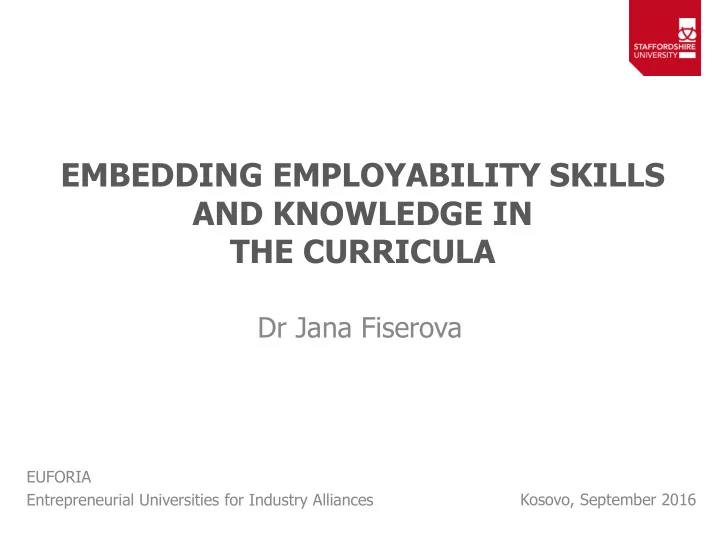

EMBEDDING EMPLOYABILITY SKILLS AND KNOWLEDGE IN THE CURRICULA Dr Jana Fiserova EUFORIA Entrepreneurial Universities for Industry Alliances Kosovo, September 2016
OUTLINE • Staffordshire University • Graduate attributes • Staffordshire Graduate Attributes • Embedding GAs in curriculum • Lessons from embedding SGAs
STAFFORDSHIRE UNIVERSITY UK Regional University in Stoke-on-Trent 23,500 students in the UK 47% from disadvantaged backgrounds 34% mature students 98% state schools 57.7% first degree graduates take up graduate level employment or further study (2017) Approx. 90% for Oxford/Cambridge 54.7% (2016), 53.6% (2015), 48.9% (2014)
GRADUATE ATTRIBUTES
GRADUATE ATTRIBUTES: CURRENT TRENDS • An increased interest in the development and embedding of Graduate Attributes (GAs) within Universities • GAs should demonstrate to stakeholders such as employers what are the core learning outcomes of a university education
GRADUATE ATTRIBUTES: WHAT ARE THEY? Graduate attributes are commonly understood as an articulation of “… the qualities, skills and understandings a university community agrees its students should develop during their time with the institution. These attributes include but go beyond the disciplinary expertise or technical knowledge that has traditionally formed the core of most university courses. They are qualities that also prepare graduates as agents of social good in an unknown future. ” (Bowden et al 2000) Bowden, J., Hart, G., King, B., Trigwell, K. & Watts, O. (2000) Generic Capabilities of ATN University Graduates. http:/www.clt.uts.edu.au/ATN.grad.cap.project.index.html
GRADUATE ATTRIBUTES: WHY ARE THEY IMPORTANT? “a set of achievements – skills, understandings and personal attributes – that makes graduates more likely to gain employment and be successful in their chosen occupations, which benefits themselves, the workforce, the community and the economy.” Yorke , M. (2006), “Learning and Employability: Employability in higher education – what it is, what is it not”, HEA Academy
GRADUATE ATTRIBUTES: ASSESSMENT It is increasingly recognised that there is a need to demonstrate achievement of GAs because Employers value GAs and often seek evidence of such achievements from applicants Governments expect evidence of GA achievement because of links made with the knowledge economy, innovation and national well-being If graduate attributes are not assessed they will not be taken seriously by students or teachers Assessment of GAs supports students and teachers in their monitoring and development
STAFFORDSHIRE GRADUATE ATTRIBUTES
IMPLEMENTING THE STAFFORDSHIRE GRADUATE A University Panel considered proposals made by Programme teams. Each Programme Specification was approved by the Faculty which was to deliver it and included a detailed mapping of where in the curriculum the skills associated with SGAs were located and assessed. Most staff teams felt they had already facilitated to some extent the SGAs in their programmes, many felt this had previously often been only implicit; Initially SGAs were to be delivered as part of a single module to first year students which focused on developing Soft (Transferable) Skills; Students were then required to complete a compulsory work-related experience of min 25 hours as part of the continued module in their second year.
LESSONS LEARNT • GAs need to be embedded into all modules; it is not sufficient nor it is effective to create a single ‘employability module’ and make it simply an additional module in a course • Rectors and Deans need to be on board to support their staff in implementing the change (e.g. professional development – PGCHPE/FHEA) • Staff need training to understand and appreciate the importance of the soft skills • Staff perceptions of soft skills delivery need to change – Not my problem / why should I care? – Important but not my role to deliver them – They are not relevant to my discipline
EXAMPLES OF EMBEDDING GA S IN THE CURRICULUM • Formative assessment – research poster presentation in a team • Reflection and PDP • Conference (or other event) organisation • Start-up business plan • Problem/practice-based learning approach to teaching – marketing plan for a product launch; customer opinion survey • Flipped classroom – technology enhanced teaching (e.g. vodcasting)
Any questions? THANK YOU FOR YOUR ATTENTION
CONTACT DETAILS Dr Jana Fiserova BA(Hons), MSc, PhD, PGCHPE, SFHEA Doctor of Business Administration Programme Director Senior Lecturer in Business Economics and Strategic Management Faculty of Business, Education and Law Staffordshire University Leek Road Stoke-on-Trent ST4 2DF Tel.: +44 (0)1782 294724 Twitter: @DrJanaFiserova Email: Jana.Fiserova@staffs.ac.uk Web: staff profile LinkedIn: Dr Jana Fiserova ResearchGate: Research profile
Recommend
More recommend